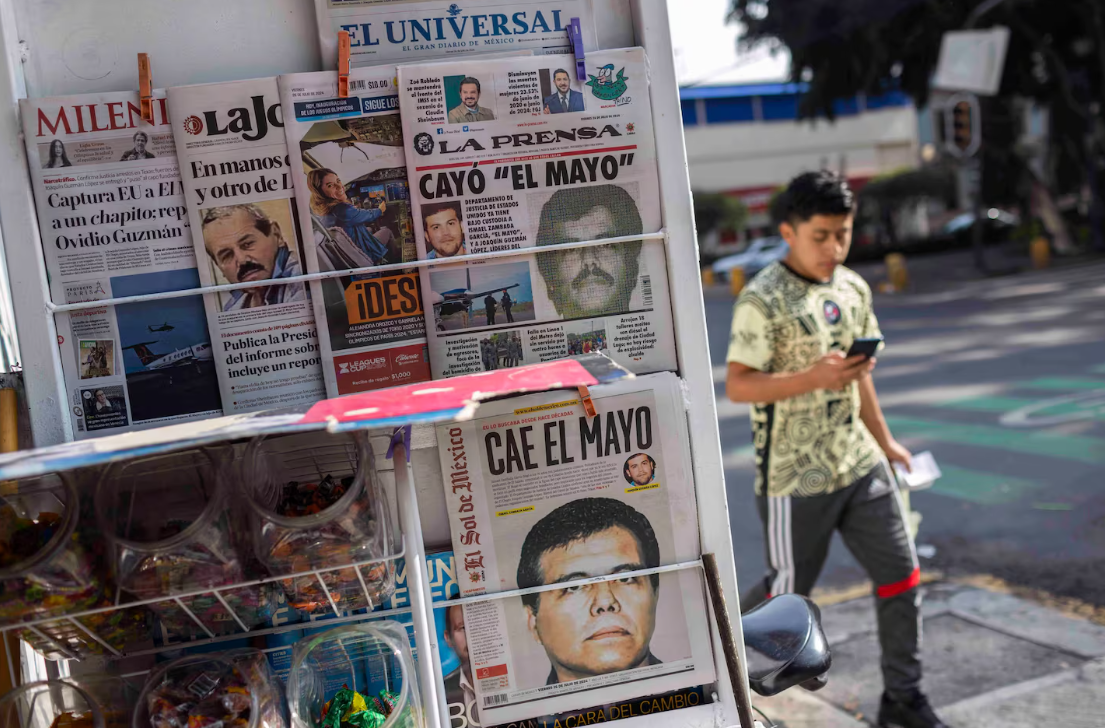美国如何抓获墨西哥最大的毒枭之一

【中美创新时报2024 年 7 月 27 日编译讯】(记者温友平编译)这听起来像是一部毒品惊悚片中的故事:墨西哥最大的毒枭之一被他前犯罪伙伴的儿子诱骗上飞机,飞过边境,并被介绍给美国联邦特工。对此,《纽约时报》记者Alan Feuer、Natalie Kitroeff 和 Emiliano Rodríguez Mega 作了下述详细报道。
尽管这看起来不太可能,但周四晚上确实发生了这样的事情,一架比奇空中国王涡轮螺旋桨飞机降落在德克萨斯州埃尔帕索市郊外的一个小型市政机场,墨西哥头号通缉犯之一伊斯梅尔·赞巴达·加西亚从飞机上下来,他是臭名昭著的锡那罗亚贩毒集团的创始人。
赞巴达·加西亚,又名埃尔马约,几十年来一直躲避墨西哥和美国官员的追捕,在锡那罗亚州的山区过着奢华简朴的生活——尽管美国悬赏 1500 万美元捉拿他。
但最终,美国官员表示,他被一个意想不到的敌人出卖了:他最亲密的犯罪盟友华金·古兹曼·洛埃拉的儿子,臭名昭著的毒枭埃尔·查波,目前正在美国联邦监狱服无期徒刑。
美国官员称,矮子的儿子华金·古兹曼·洛佩斯欺骗赞巴达·加西亚登上飞机,告诉他他们要去墨西哥北部看房地产。老人根本不知道他实际上是在前往德克萨斯州的途中,在那里他将被交到长期跟踪他的美国特工手中。

这次戏剧性的跨境飞行之前,古兹曼·洛佩斯与美国联邦调查局和国土安全部的一小队执法人员进行了多年的秘密接触,自五年前古兹曼·洛埃拉因毒品阴谋罪被定罪以来,他们一直在顽强地追捕他、他的三个兄弟和赞巴达·加西亚。
目前尚不清楚执法人员在多大程度上影响或指挥了周四发生的事件,但据两位知情人士透露,他们知道赞巴达·加西亚在飞机接近美国边境时就在飞机上。
最终,无论他们扮演了什么角色,美国特工都得到了他们想要的东西:他们逮捕了一个非常重要的犯罪目标,而这个目标一直未能抓获,他们长期以来一直怀疑墨西哥官员能否——或者会——抓获他们。
两人被捕几乎立即在墨西哥引发了一系列质疑,墨西哥政府表示,它没有发挥任何作用,直到美国大使馆打电话告知赞巴达·加西亚和古兹曼·洛佩兹被拘留的消息,它才知道发生了什么。
周五上午,墨西哥安全部长罗莎·伊塞拉·罗德里格斯在接受记者采访时表示,政府不知道此次逮捕是否是与美国检察官达成的协议的一部分。
“这都是调查的一部分,无论是抓捕还是自首,”罗德里格斯说。“这是美国政府必须解释的一部分。”
墨西哥总统安德烈斯·曼努埃尔·洛佩斯·奥夫拉多尔表示,他的政府希望美国政府就拘留的发生情况提供一份“全面报告”,包括是否曾与赞巴达·加西亚或古兹曼·洛佩斯达成过协议。
“不存在不信任,”他补充道。“我们一直要求的是尊重。”
目前还没有正式引渡赞巴达·加西亚的请求,他在美国被起诉已有二十多年,在多个州被指控犯有重叠的毒品阴谋罪。尽管美国官员未能在墨西哥境内抓获他,即使在墨西哥海军精锐部队的帮助下,但近年来还是有几次险些被抓获。
通过欺骗赞巴达·加西亚上飞机,古兹曼·洛佩兹给了美国梦寐以求的赏金。而且,这样做也可能增加了他自己和他最亲密的兄弟奥维迪奥·古兹曼·洛佩兹获得有利交易的机会,奥维迪奥·古兹曼·洛佩兹已经在美国联邦拘留中。
赞巴达·加西亚周五放弃了在埃尔帕索美国地方法院的听证会上亲自出庭的机会,通过律师对毒品阴谋指控表示不认罪。他被拘留,等待定于周三举行的拘留听证会。
古兹曼·洛佩兹预计将于周二在芝加哥美国地方法院出庭接受自己的初次听证会。
据三位知情人士透露,美国执法人员与古兹曼·洛佩斯保持着秘密联系,自从去年 9 月奥维迪奥被引渡到芝加哥接受审判后,这种联系的频率有所增加。
虽然目前尚不清楚这种联系对他诱骗赞巴达·加西亚的决定有多大影响,但向美国检察官提供 El Mayo 这样的奖品只会增加他在未来的认罪协议中获得友好条件的机会。
美国官员至少三年来一直在与赞巴达·加西亚就他可能自首的问题进行秘密谈判,尽管这些谈判最终毫无进展。
周五,罗德里格斯表示,当局认为一架私人塞斯纳飞机将两名犯罪头目运出了该国,并公开确认飞行员是一名名叫拉里·柯蒂斯·帕克的美国公民。
她说,飞机于周四上午 8 点左右起飞。但一位熟悉此案情况的美国官员表示,将两名男子从埃莫西约送出的飞机是一架比奇飞机,该飞机于下午 2 点左右离开机场。
周五下午,一位自称帕克的男子通过电话联系到他,他表示墨西哥官员错误地将他称为将两名男子送过边境的飞行员。帕克承认他驾驶的是一架小型塞斯纳飞机,并表示周四在埃莫西约机场看到一架比奇飞机停在他自己的飞机旁边。
他说他与卡特尔组织成员没有任何关系。“我只是一个干净利落、勤奋工作的美国人,”帕克说。
一位未获授权公开发言的墨西哥安全部官员表示,调查将确定飞行员身份是否存在错误。
长期以来,赞巴达·加西亚一直被认为是墨西哥黑社会的教父,也是墨西哥现存最精明的头目之一。加西亚被捕一事在墨西哥引起轰动,是近年来对有组织犯罪的最大打击之一。
布鲁金斯学会高级研究员、全球毒品政策专家万达·费尔巴布-布朗表示:“这次逮捕真的会撼动墨西哥市场。”她表示,这可能会引发“整个美洲地区大量的暴力和不稳定”。
如果赞巴达·加西亚真的被出卖,“锡那罗亚州就会爆发战争”,驻墨西哥城的安全分析师爱德华多·格雷罗表示,未来几周将掀起一波又一波的暴力浪潮。他表示,锡那罗亚贩毒集团的衰弱也可能促使竞争对手哈利斯科州新一代贩毒集团进军新领地。
墨西哥军方在一份声明中表示,周五,至少 200 名墨西哥特种部队成员被部署到贩毒集团在锡那罗亚州的大本营库利亚坎,以加强安全。
一些美国官员表示,此次逮捕也可能产生政治影响,特别是如果赞巴达·加西亚决定与美国当局合作,透露他所知道的墨西哥腐败情况的话。
过去几个月,锡那罗亚贩毒集团遭到一波针对该组织高层的逮捕浪潮。
5 月,当局认为是古兹曼四兄弟头号杀手的内斯托·伊西德罗·佩雷斯·萨拉斯因毒品阴谋指控被引渡到纽约,这是一项庞大起诉书的一部分,起诉书指控埃尔·查波的儿子是世界上最猖獗的芬太尼走私者之一。另一名锡那罗亚州刺客嫌疑人豪尔赫·伊万·加斯特鲁姆·阿维拉 (Jorge Iván Gastélum Ávila) 去年被引渡到华盛顿接受审判。
但专家表示,这些逮捕不太可能对芬太尼和其他毒品跨境流动产生影响。
“这不是致命打击,”蒙特利尔大学犯罪学教授瓦伦丁·佩雷达 (Valentin Pereda) 说。“锡那罗亚州的每个人都为埃尔·查波被捕而感到悲痛。但与此同时,该组织幸存下来并继续发展。”
费尔巴布-布朗补充说:“要让世界发现芬太尼贩运动态的变化,该集团内部还需要数月的真正激烈的战争。”“我们离那一刻还很远。”
本文最初发表于《纽约时报》。
题图:7 月 26 日,墨西哥报纸头版刊登了墨西哥城抓获 Ismael “El Mayo” Zambada 的消息。RODRIGO OROPEZA/AFP VIA GETTY IMAGES
附原英文报道:
How the US captured one of Mexico’s biggest drug lords
By Alan Feuer, Natalie Kitroeff and Emiliano Rodríguez Mega New York Times,Updated July 27, 2024
It sounded like a story ripped from a narco thriller: One of the biggest drug lords in Mexico was lured onto an airplane, flown across the border and presented to U.S. federal agents by the son of his former partner in crime.
As improbable as it may seem, that is exactly what appears to have happened Thursday evening, when a Beechcraft King Air turboprop landed at a small municipal airport outside El Paso, Texas, and off stepped one of the most wanted men in Mexico: Ismael Zambada García, a founder of the notorious Sinaloa drug cartel.
Zambada García, known as El Mayo, had for decades evaded capture by both Mexican and U.S. officials, living a life of luxurious simplicity in the mountains of Sinaloa — despite the $15 million U.S. bounty on his head.
But in the end, U.S. officials said, he was betrayed by an unlikely foe: a son of his closest criminal ally, Joaquín Guzmán Loera, the infamous drug lord known as El Chapo, who is now serving a life sentence in a U.S. federal prison.
El Chapo’s son, Joaquín Guzmán López, tricked Zambada García into boarding the plane, the U.S. officials said, telling him they were going to look at real estate in northern Mexico. The older man had no idea that he was actually en route to Texas, where he would be delivered into the hands of U.S. agents who had long been on his tail.
The dramatic cross-border flight came after years of quiet contact between Guzmán López and a small team of U.S. law enforcement officers in the FBI and Homeland Security Department who had doggedly been chasing him, his three brothers and Zambada García in the wake of Guzmán Loera’s landmark conviction on drug conspiracy charges five years ago.
It remains unclear at this point how much the law enforcement officers shaped or directed the events that unfolded Thursday, but they were aware that Zambada García was on the plane as it neared the U.S. border, according to two people familiar with the matter.
And in the end, regardless of what role they played, the U.S. agents got what they wanted: They apprehended a hugely important criminal target that had eluded capture and that they had long doubted Mexican officials could — or would — get for them.
Almost immediately, the two arrests unleashed a torrent of questions in Mexico, where the government said that it played no role and that it was unaware anything had taken place until the U.S. Embassy called with the news that Zambada García and Guzmán López were in custody.
Grilled by reporters Friday morning, Mexico’s secretary of security, Rosa Icela Rodríguez, said the government did not know whether the arrest was part of a deal with U.S. prosecutors.
“It’s part of the investigations, whether it was a capture or a surrender,” Rodríguez said. “That’s part of what the U.S. government will have to explain.”
Mexican President Andrés Manuel López Obrador said his administration expected the U.S. government to give a “full report” on how the detentions took place — including whether there was a previous agreement with Zambada García or Guzmán López.
“There is no distrust,” he added. “What we have always asked for is respect.”
There was no formal extradition request for Zambada García, who has been under indictment in the United States for more than two decades, with overlapping drug conspiracy charges in multiple states. And although U.S. officials have been unable to catch him inside Mexico, even with the help of elite troops from the Mexican navy, there have been several near misses in recent years.
By duping Zambada García onto the plane, Guzmán López gave the United States the bounty it had long been after. And, in doing so, he may have also increased his own chances of getting a favorable deal for himself and the brother he is closest to, Ovidio Guzmán López, who was already in U.S. federal custody.
Zambada García waived a personal appearance Friday at a hearing in U.S. District Court in El Paso, entering a plea of not guilty to drug conspiracy charges through a lawyer. He was held in custody pending a detention hearing scheduled for Wednesday.
Guzmán López is expected to appear Tuesday for his own initial hearing in U.S. District Court in Chicago.
U.S. law enforcement agents have maintained a quiet back channel with Guzmán López for some time, one that increased somewhat in frequency after Ovidio was extradited to face trial in Chicago last September, according to three people familiar with his situation.
Although it remains unclear how much effect that outreach had on his decision to trick Zambada García, delivering a prize such as El Mayo to U.S. prosecutors could only help his chances of getting friendly terms in any future plea deal.
U.S. officials had also been quietly negotiating on and off for at least three years with Zambada García about his own potential surrender, although those talks eventually went nowhere.
On Friday, Rodríguez suggested that authorities believed a private Cessna plane carried the two crime bosses out of the country, publicly identifying the pilot as an American citizen named Larry Curtis Parker.
She said the plane took off about 8 a.m. on Thursday. But a U.S. official familiar with the facts of the case said the plane that flew the two men out of Hermosillo was a Beechcraft that had left the airport at about 2 p.m.
Reached by phone Friday afternoon, a man who identified himself as Parker said Mexican officials were wrong in naming him as the pilot who had flown the two men over the border. Parker acknowledged that he flew a small Cessna and said he saw a Beechcraft parked near his own plane at the Hermosillo airport Thursday.
He said he had nothing to do with cartel figures. “I’m just a clean-cut, hardworking American,” Parker said.
An official with Mexico’s security ministry who was not authorized to speak publicly said an investigation would determine whether there was any mistake in identifying the pilot.
The arrest of Zambada García — long considered a godfather in his country’s underworld and one of its shrewdest remaining capos — resounded across Mexico as one of the biggest blows to organized crime in recent years.
“This is the one arrest that can really shake up the Mexican market,” said Vanda Felbab-Brown, a senior fellow at the Brookings Institution and an expert on global drug policy, saying it could provoke “a tremendous amount of violence and instability across the Americas.”
If Zambada García was indeed betrayed, “there is going to be war within Sinaloa,” said Eduardo Guerrero, a security analyst based in Mexico City, generating brutal waves of violence in the coming weeks. A weakened Sinaloa cartel, he said, could also prompt the rival Jalisco New Generation cartel to push into new territory.
On Friday, at least 200 members of the Mexican Special Forces were deployed to Culiacán, the cartel’s stronghold in Sinaloa, to beef up security, the Mexican military said in a statement.
The arrest could also have political implications, some U.S. officials said, particularly if Zambada García decides to cooperate with U.S. authorities and divulge what he knows about corruption in his country.
The Sinaloa cartel has been battered over the past several months by a wave of arrests targeting the upper echelon of the organization.
In May, Néstor Isidro Pérez Salas, who authorities believe is a top assassin for the four Guzmán brothers, was extradited to New York on drug conspiracy charges, part of a sprawling indictment that accuses El Chapo’s sons of being among the world’s most prolific smugglers of fentanyl. Another suspected Sinaloa assassin, Jorge Iván Gastélum Ávila, was extradited last year to stand trial in Washington.
But experts said the arrests were unlikely to make a dent in the flows of fentanyl and other drugs across the border.
“It’s not a fatal blow,” said Valentin Pereda, a professor of criminology at the University of Montreal. “Everybody in Sinaloa mourned the arrest of El Chapo. But at the same time, the organization survived and continued growing.”
“It would take months of really intensive warfare” within the cartel for the world to detect a change in fentanyl trafficking dynamics, Felbab-Brown added. “We’re far away from that moment.”
This article originally appeared in The New York Times.

